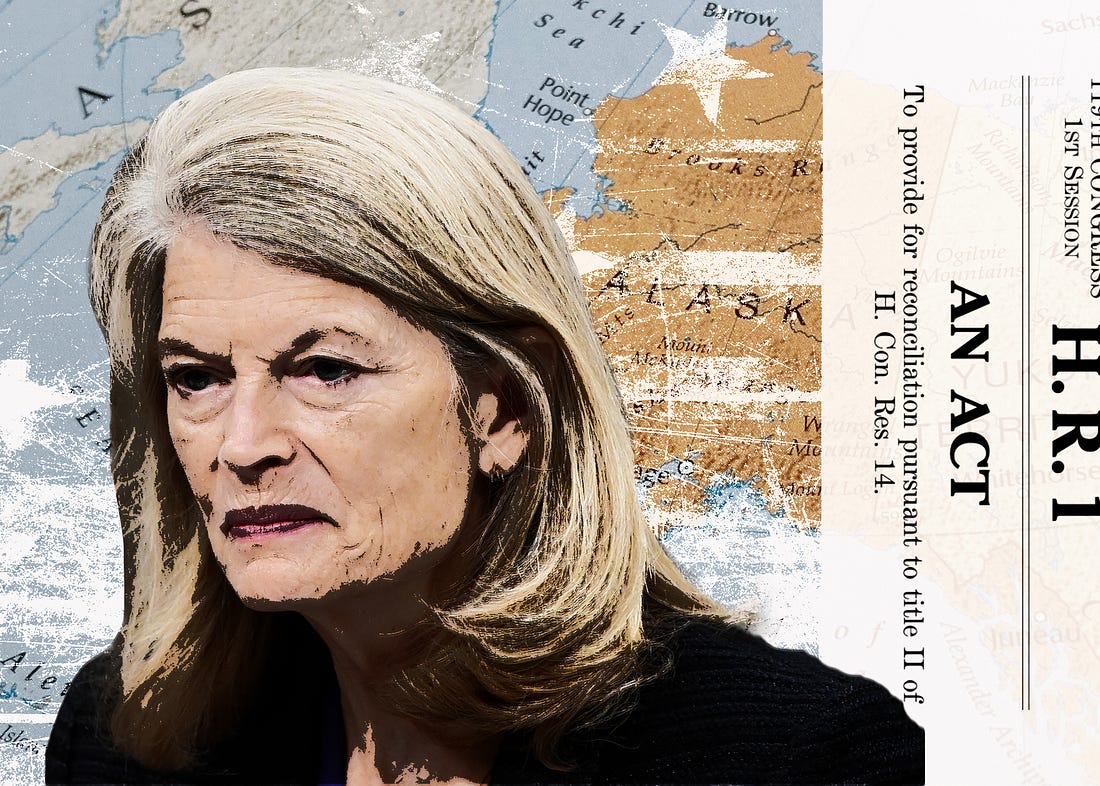|
 |
Good afternoon, Press Pass readers and happy Bobby Bonilla Day to all who celebrate. I don’t want to brag, but I think The Bulwark has had the best coverage of the ongoing GOP budget fight through our various newsletters and podcasts. If you’ve enjoyed our coverage or wanted to feel even more in the loop as things unfold, please upgrade to a Bulwark+ subscription:
Today’s edition brings you to the Senate, where all through the night and into this morning, Republicans pushed their budget toward the finish line—which they finally reached this afternoon by the skin of their teeth. Let’s get into how it happened and what it all means going forward.
Polar payoff
The business proposition of organized crime isn’t complicated: Parasitic gangsters suck the hard-earned money out of good citizens’ wallets to line their own pockets and deliver kickbacks up the chain of command. In the United States Senate, Lisa Murkowski has made Alaska into pretty important turf. Her unique ability to waffle on major deals or rebel against major nominations in the Trump era has put her in a prime position to collect when it’s time.
So last night and well into the early hours of this morning, Republican leaders turned their attention to Murkowski. They may have titles like “chairman” or “majority leader” or “whip,” but for at least 24 hours no one doubted who the boss really was.
To appease Murkowski, Republicans initially sought two special carveouts for Alaska: One would exempt Alaska from cuts to the SNAP food-assistance program for people with low incomes, and the other would create an Alaska-shaped exception to Republicans’ efforts to gut Medicaid. Because the bill had to conform to the Senate’s strict rules for budget-reconciliation bills, the parliamentarian threw out the Medicaid exemption. But they kept the SNAP one—by making it so that states with elevated error rates in their payments could delay implementing work requirements. Yes, it literally would pay to have an error-prone system.
Other major bosses that Republicans tried to buy off included Sens. Rand Paul (R-Ky.), Susan Collins (R-Maine), and Thom Tillis (R-N.C.). Among other offers, GOP leadership proposed eliminating an excise tax on solar and wind energy and doubling the rural hospital fund (a pocket of money that was there to undo the harm caused by the other parts of the bill they were passing) to $50 billion through 2030.
They weren’t won over. Fresh off an announcement that he will not seek re-election, Tillis felt comfortable calling the bill a sham that will wreak havoc on the health care system. Collins was less vocal in her opposition, but it didn’t seem like Republican leaders saw her as gettable. For Paul, there was a brief discussion about lowering the debt ceiling from a $5 trillion increase to just $500 billion. That was not entertained for long, as it would hand Democrats a major leverage point likely later this year and no other Republican besides Paul actually cares about the national debt anymore.
So Murkowski became the final senator to court in order to get the necessary 50 votes on their swamp water budget. (Budget-reconciliation bills can’t be filibustered, hence the 50-vote threshold; Vice President JD Vance ultimately cast the deciding vote.)
Ironically, Murkowski has played this role before only to scoff at the idea of a “polar payoff.” In 2017, when Republicans were seeking to repeal and replace the Affordable Care Act, then-Senate Majority Leader Mitch McConnell sought to allow Alaska—and Alaska only—to access a multi-billion-dollar fund. The legislation reserved $182 billion for states with high health insurance premiums, but one percent of that fund was specifically dedicated to states with premiums at least 75 percent higher than the national average; only Alaska met that threshold.
To Murkowski’s credit, she saw through the cynicism of the kickback, saying at the time, “Let’s just say that they do something that’s so Alaska-specific just to, quote, ‘get me.’ Then you have a nationwide system that doesn’t work. . . . That then comes crashing down and Alaska’s not able to kind of keep it together on its own.”
When Republicans attempted to repeal Obamacare again later that year, they also sought carveouts for Alaska to get Murkowski over the finish line. Among these was a proposal for grandfathering native Alaskans into Medicaid to exempt them from expansions that were set to be rolled back several years later. Alaska’s low population density would have also helped it obtain special access to federal funds.
Nonetheless, Murkowski held firm and refused to help Republicans rip apart the Affordable Care Act.
Less than a month ago, it seemed like we’d see the same show again. Murkowski promised to make sure that “Alaskans and people around the country are not impacted in a negative way” (emphasis ours).
That didn’t last. On Tuesday, Murkowski voted to gut Medicaid for the nation (in addition to all the other components of this bill). Instead of raising a principled objection to stop it from happening, she suggested she would try to work in the future to make the very thing she just allowed to happen less bad.
“My hope,” she told reporters after the vote, “is that the House is gonna look at this and recognize that we’re not there yet.”
When a reporter asked Murkowski (quoting Rand Paul) whether the deal Republicans struck to obtain her vote counted as a “bailout” for Alaska, Murkowski glared at him silently for thirteen seconds before defending herself and saying “I find that offensive.”
